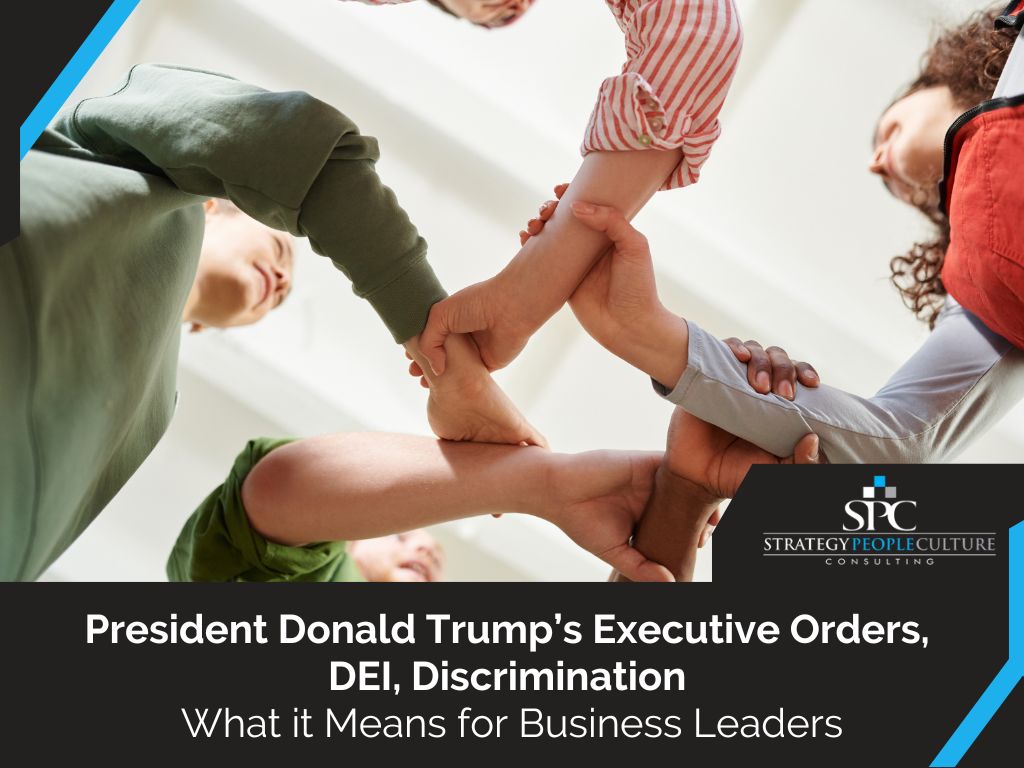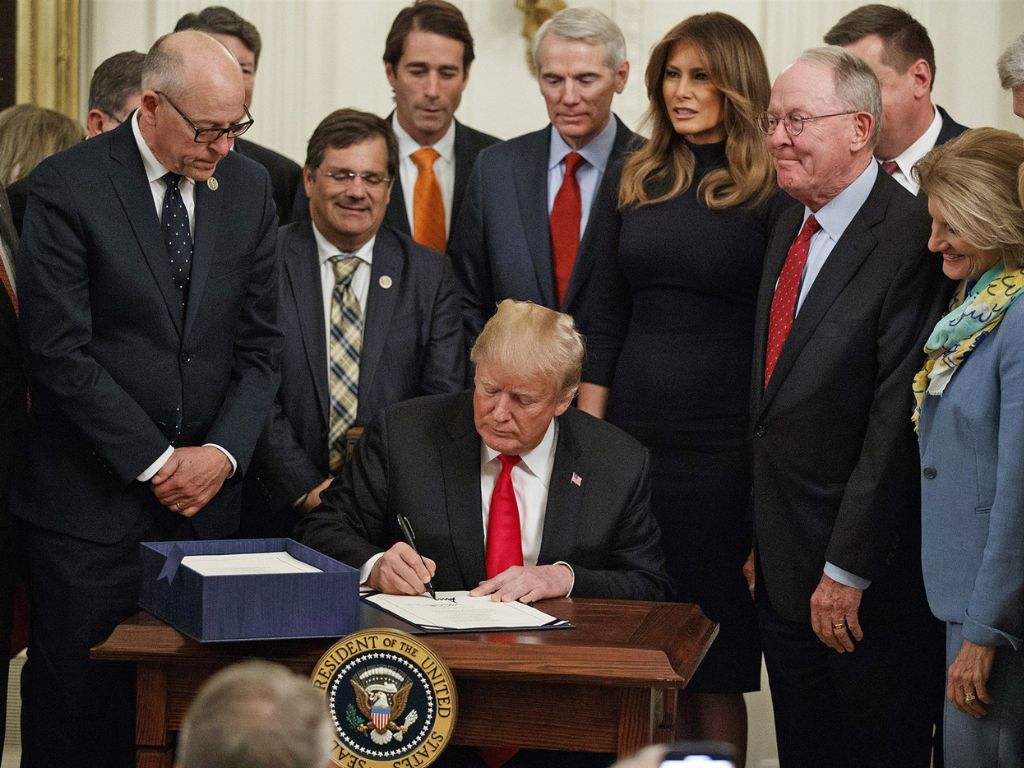President Donald Trump’s Executive Orders, DEI, Discrimination – What it Means for Business Leaders

Newly inaugurated President Trump, in his first week of office, issued a flurry of Executive Orders. One of these Executive Orders is entitled “Ending Illegal Discrimination and Restoring Merit-Based Opportunity.” A second of these Orders was Executive Order 14166, entitled “Defending Women From Gender Ideology Extremism and Restoring Biological Truth to the Federal Government.” This blog is not an opinion piece, as we are not sharing a philosophical or political opinion; our hope is to bring some education and clarity in otherwise unclear moments in time.
What Do These New Executive Orders Mean?
In simple terms, the Orders take aim directly at Diversity, Equity, and Inclusion (commonly referred to as DEI) and definitionally around sexes that do not conform to male and female (sometimes referred to as birth listed on a person’s birth certificate as Cisgender).
The Executive Orders put an end to the federal government promoting diversity and requirements of federal contractors to have affirmative action plans. The Orders further put pressure on private businesses as, prospectively, federal contractors must certify they are not running any DEI programming that runs in conflict with federal anti-discrimination laws.
The Executive Orders are forcing posture changes and philosophical approaches within government agencies. For example, the new Acting Chair of the Equal Employment Opportunity Commission (EEOC) altering the agencies position and priorities matters that defend biological and binary sexes in addition to modifying their application of various pronouns.
What is an Executive Order?

Executive Orders are a power the President of the United States has to make decrees that have the effect of law; however, this power is NOT permitted to violate other actual laws passed by the other Branches of Government. These Executive Orders do not repeal or change the law, though they can repeal and change current Executive Orders otherwise in force.
Federal Anti-Discrimination Law – What Has NOT changed and clearing up the confusion
The Civil Rights Act of 1964 and a myriad of laws in the subsequent 65 years still apply. Employees working in this country still have a right protected by federal law, and in many cases, various State laws, and employers have not been absolved of responsibilities to create environments free from sexual harassment or discrimination. Bostick still stands, protecting Gender Identity in the Workplace. For example, a transgender person still has rights from being discriminated against at work because of their gender identity.
Employer Responsibilities that Are UNCHANGED

Employers are still required to adhere to Federal, State, and Local Laws around the United States. Here is a simplified list of some employer responsibilities:
- Provide equal employment opportunities
- Not making employment-based decisions on anything to do with a protected class.
- This still includes Sexual Orientation and Gender Identity
- Importance of culture and creating an environment where long-term productivity is maximized
- Duty to Exercise the Reasonable Care standard still applies in most situations– this means employers lose the availability of certain defenses (frequently referred to as the Faragher-Ellerth defense) unless they do all the following:
- Have policies communicating anti-harassment and anti-discrimination
- Provide training on sexual harassment and discrimination
- Have complaint procedures
- Promptly investigate complaints
- Take timely corrective action in the event of harassment or discrimination.
It is critical to not confuse efforts around affirmative DEI programming and promotion with basic discriminatory action or conduct of sexual harassment.
Your Role as a Leader
Undoubtedly, change is occurring. Regardless of where you stand on any given issue, the agenda of the Whitehouse will have an impact on issues around gender identity, diversity, equity, and inclusion and have a ripple effect on some elements of treatment on certain classes of people. We will likely see political fights, lawsuits between States and the Federal Government, private lawsuits from organizations such as the ACLU (American Civil Liberties Union), and more, making this a period of potential flux, debate, and transition.
These changes may have direct and practical implications in your workplace on issues such as bathroom usage. It is more important than ever to ensure you are connected with your attorney to stay on top of these changes as they may impact your workplace. It is equally as important as ever that you have the right challenge partner to push your thinking on how you lead through these times.

If you have read our past blogs, you hopefully deducted that our view suggests there is not a singular answer to being a great leader, as leadership varies from person to person. Fundamental leadership, however, is maximized through an intentional approach.
Creating clarity in your organization is critical as employees may be allowing their personal views to be contradictory to your company policies, creating a myriad of potential problems for the organization. Most of us have opinions on virtually everything; it is human nature.
Sometimes, our opinions are more thought through than others, and none of our opinions should necessarily be discounted. We are learning that people’s reactions, thoughts, and opinions in response to some of these Executive Orders are already causing disruption in the workplace. We have seen real stories where Managers are acting out by saying/doing inappropriate things, feeling they no longer need to be ‘politically proper’, such as now making sexual-oriented comments to women in the workplace.
Allowing this type of behavior is poor risk management and permits overreaction, so uninformed actions create problems in your workplace; if this type of behavior amplifies, it accelerates the possibility of expensive lawsuits, lower employee productivity, and worsening business fundamentals.
The Importance of a Challenge Partner

Changes in the Executive Administration in the United States typically come with policy changes, and we have seen aggressive policy implemented quickly in 2025 by President Trump. The challenges ahead are weighty, requiring careful attention by employers around the United States and better leadership. By staying informed, engaged, and proactive, employers can ensure they are managing their risk, mitigating issues of harassment and discrimination in their organizations, and facilitating productive workplace cultures, ultimately leading to a stronger enterprise.
If there has ever been a time for leaders to have a challenge partner into their leadership, the time is now! At Strategy People Culture, this is our expertise. Schedule a consultation with us today to start your journey.
